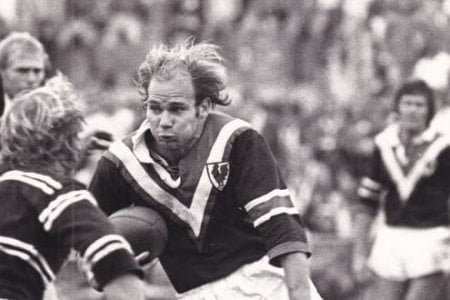'His time is limited': Aussie footy legend faces heartbreaking diagnosis
By
Danielle F.
- Replies 5
It's a sad day for rugby league fans across Australia, as one of the game's most beloved and talented athletes broke sad news for fans of the sport.
Johnny Mayes, a name that resonates with footy fans of all ages, shared a devastating health update.
Known for his lightning-fast runs, sharp brain, and infectious team spirit, Johnny Mayes carved out a remarkable career.
He won premierships with both the Manly-Warringah Sea Eagles and the Sydney Roosters (then known as Eastern Suburbs) throughout his career.
Mayes started as a local junior and made his mark with the Roosters before a brief stint at Manly in 1973.
There, he helped the Sea Eagles clinch a premiership before returning to the Roosters to play a pivotal role in their back-to-back titles back in 1974 and 1975.
Mayes' on-field partnership with Bob Fulton, Ray Branighan, Ken Irvine, and Max Brown became a key ingredient in his teams' successes.
His ability to read the play, create opportunities, and keep opposition defences guessing made him a constant threat and a fan favourite.
He also represented Australia in the 1975 Rugby League World Cup.
However, the 78-year-old football star revealed that he only has weeks to live.
This news followed Mayes' recent MRI scan, which showed a 'very aggressive brain tumour'.
The news came as a shock to Mayes' family.
'The doctors tell us his time is limited—maybe a few weeks, if we are lucky, a couple of months,' his son, Glen, shared in a post.
'The fortunate thing is that he is in no pain. He has paralysis down the left side of his body and is also suffering from dementia.'
'All we can do is try to make the most of the time he has left,' Glen added.
As news of Mayes' diagnosis spread, tributes immediately poured in from former teammates, fans, and the rugby league community.
Peter 'Zorba' Peters, Mayes' former Manly teammate, spoke fondly of the retired athlete.
'Little Monkey had a heart bigger than himself. He replaced Dennis Ward from our 1972 inaugural premiership winning side after switching to Manly from Easts,' Peters shared.
'Johnny was a team player through and through and a very popular person wherever he played.'
Fans also took to social media and football forums to share their memories and well-wishes for Mayes.
'A shrewd recruit who made Manly great', one commented.
'Used to love watching him play, even when he was at the Roosters as well,' another one shared.
'Very sad news...lovely fella—thoughts with him,' a third added.
For many senior footy fans, Johnny Mayes was more than just a name in the books—he was a symbol of the grit, determination, and sportsmanship that defined rugby league in its heyday.
His story was a testament to the power of teamwork, resilience, and the joy of playing the game.
Our thoughts are with Johnny Mayes and his family at this difficult time.

Were you lucky enough to see Johnny Mayes in his prime? Do you have a favourite memory of his time as an athlete? We would love to hear your stories and tributes for Johnny Mayes in the comments section below. Let us come together as a community and wish Johnny Mayes all the best in his health.
Johnny Mayes, a name that resonates with footy fans of all ages, shared a devastating health update.
Known for his lightning-fast runs, sharp brain, and infectious team spirit, Johnny Mayes carved out a remarkable career.
He won premierships with both the Manly-Warringah Sea Eagles and the Sydney Roosters (then known as Eastern Suburbs) throughout his career.
Mayes started as a local junior and made his mark with the Roosters before a brief stint at Manly in 1973.
There, he helped the Sea Eagles clinch a premiership before returning to the Roosters to play a pivotal role in their back-to-back titles back in 1974 and 1975.
Mayes' on-field partnership with Bob Fulton, Ray Branighan, Ken Irvine, and Max Brown became a key ingredient in his teams' successes.
His ability to read the play, create opportunities, and keep opposition defences guessing made him a constant threat and a fan favourite.
He also represented Australia in the 1975 Rugby League World Cup.
However, the 78-year-old football star revealed that he only has weeks to live.
This news followed Mayes' recent MRI scan, which showed a 'very aggressive brain tumour'.
The news came as a shock to Mayes' family.
'The doctors tell us his time is limited—maybe a few weeks, if we are lucky, a couple of months,' his son, Glen, shared in a post.
'The fortunate thing is that he is in no pain. He has paralysis down the left side of his body and is also suffering from dementia.'
'All we can do is try to make the most of the time he has left,' Glen added.
As news of Mayes' diagnosis spread, tributes immediately poured in from former teammates, fans, and the rugby league community.
Peter 'Zorba' Peters, Mayes' former Manly teammate, spoke fondly of the retired athlete.
'Little Monkey had a heart bigger than himself. He replaced Dennis Ward from our 1972 inaugural premiership winning side after switching to Manly from Easts,' Peters shared.
'Johnny was a team player through and through and a very popular person wherever he played.'
Fans also took to social media and football forums to share their memories and well-wishes for Mayes.
'A shrewd recruit who made Manly great', one commented.
'Used to love watching him play, even when he was at the Roosters as well,' another one shared.
'Very sad news...lovely fella—thoughts with him,' a third added.
For many senior footy fans, Johnny Mayes was more than just a name in the books—he was a symbol of the grit, determination, and sportsmanship that defined rugby league in its heyday.
His story was a testament to the power of teamwork, resilience, and the joy of playing the game.
Our thoughts are with Johnny Mayes and his family at this difficult time.
Key Takeaways
- Footy legend Johnny Mayes has been diagnosed with a very aggressive brain tumour and has only 'weeks to live'.
- Mayes was best known for winning ARL premierships with both the Roosters and Manly Sea Eagles in the 1970s.
- Former teammates and footy fans paid tribute to Mayes and described him as a brilliant halfback, a true team player and a popular figure wherever he played.
- Mayes' family described the diagnosis as a huge shock but are focused on making the most of the limited time he has left.








